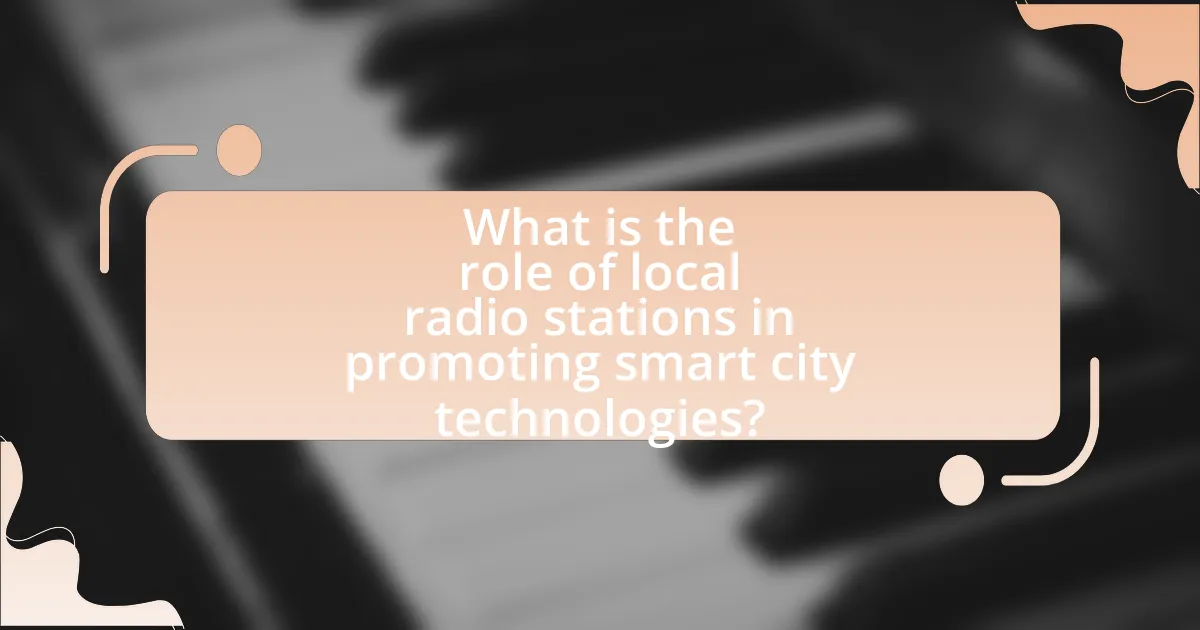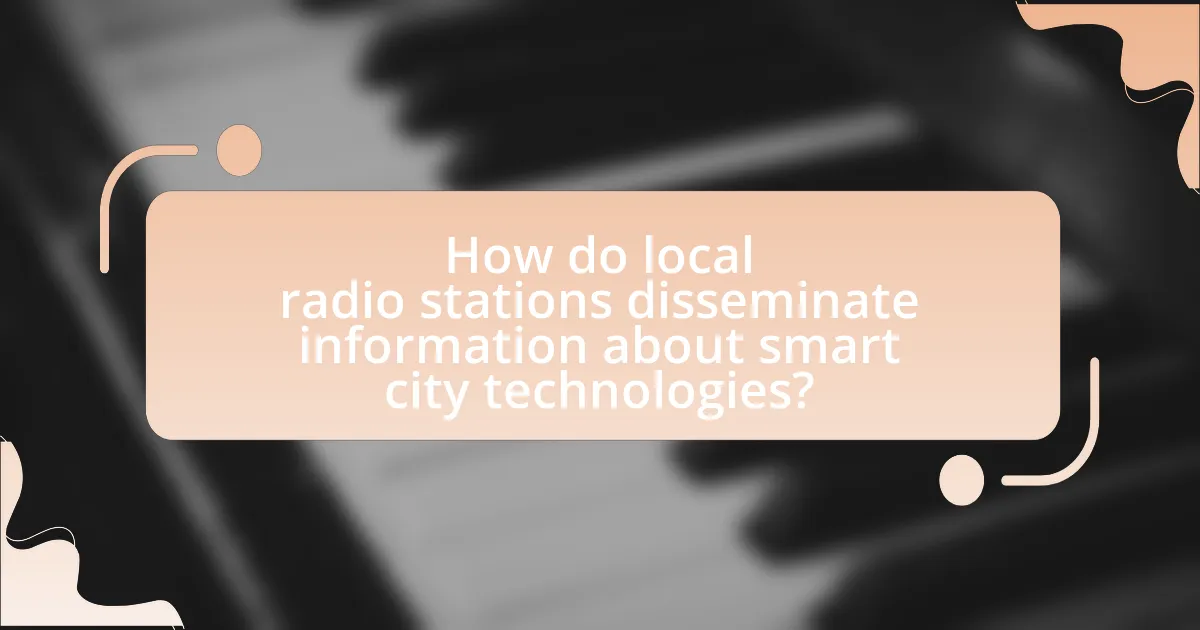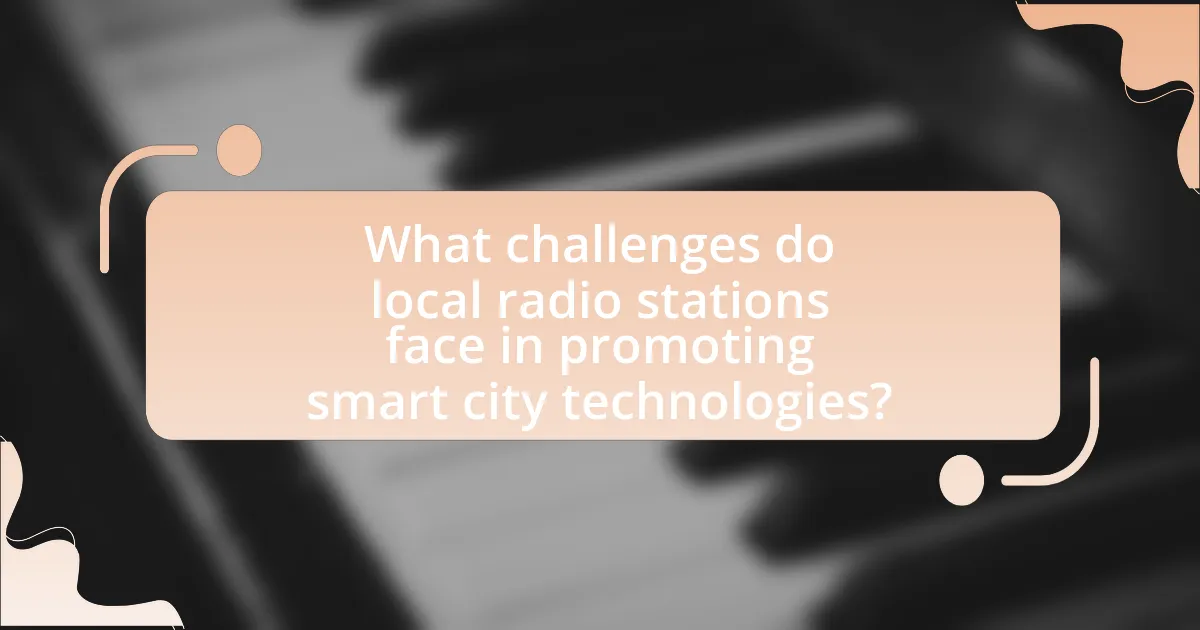Local radio stations serve as essential platforms for promoting smart city technologies by providing localized information and fostering community engagement. They educate residents about innovations such as energy-efficient systems, smart transportation, and digital infrastructure through interviews and discussions with experts and local leaders. By enhancing public understanding and participation in smart city initiatives, local radio stations play a critical role in building informed citizenry and facilitating dialogue between local governments and communities. Additionally, they face challenges such as limited resources and competition from digital media, which they can address through innovative engagement strategies and collaborations with local organizations.

What is the role of local radio stations in promoting smart city technologies?
Local radio stations play a crucial role in promoting smart city technologies by serving as accessible platforms for information dissemination and community engagement. They provide localized content that educates residents about smart technologies, such as energy-efficient systems, public transportation innovations, and digital infrastructure improvements. By broadcasting interviews with city officials, experts, and community leaders, local radio stations facilitate discussions that raise awareness and encourage public participation in smart city initiatives. Furthermore, studies indicate that community-based media, including local radio, significantly enhance public understanding and acceptance of new technologies, thereby fostering a more informed citizenry that is essential for the successful implementation of smart city projects.
How do local radio stations contribute to the awareness of smart city technologies?
Local radio stations contribute to the awareness of smart city technologies by broadcasting informative programs that educate listeners about innovations and initiatives in their communities. These stations often feature interviews with local government officials, technology experts, and community leaders who discuss the benefits and applications of smart technologies, such as improved public transportation and energy efficiency. For instance, a study by the Pew Research Center found that local media plays a crucial role in disseminating information about civic engagement and technological advancements, thereby enhancing public understanding and participation in smart city projects.
What types of smart city technologies are commonly discussed on local radio?
Commonly discussed smart city technologies on local radio include smart transportation systems, energy-efficient infrastructure, and IoT (Internet of Things) applications. Smart transportation systems, such as real-time traffic management and smart public transit, enhance mobility and reduce congestion. Energy-efficient infrastructure, including smart grids and renewable energy solutions, promotes sustainability. IoT applications, which connect various city services and devices, improve efficiency and data collection for urban management. These discussions often highlight the benefits of these technologies in improving urban living and addressing challenges faced by cities.
How do local radio stations engage their audience with smart city topics?
Local radio stations engage their audience with smart city topics by broadcasting informative programs that discuss urban innovation, sustainability, and technology integration. These stations often feature expert interviews, community discussions, and listener call-ins to foster interaction and provide diverse perspectives on smart city initiatives. For example, a study by the Pew Research Center found that local media plays a crucial role in community engagement, with 62% of listeners valuing local news coverage on technological advancements that impact their daily lives. This engagement not only educates the audience but also encourages public participation in local smart city projects.
Why are local radio stations important for community engagement in smart city initiatives?
Local radio stations are crucial for community engagement in smart city initiatives because they serve as accessible platforms for disseminating information and fostering dialogue among residents. These stations provide localized content that addresses specific community needs, ensuring that citizens are informed about smart city projects, such as infrastructure improvements and technology implementations. Research indicates that local media, including radio, significantly enhances public participation by creating a sense of belonging and encouraging feedback, which is essential for the success of smart city initiatives. For instance, a study by the Pew Research Center found that 63% of local radio listeners feel more connected to their community, highlighting the role of radio in building trust and facilitating communication between local governments and residents.
How do local radio stations facilitate community discussions about smart city technologies?
Local radio stations facilitate community discussions about smart city technologies by providing a platform for local voices, expert interviews, and public forums. They engage listeners through talk shows and call-in segments, allowing community members to express their opinions and ask questions about smart city initiatives. For instance, a study by the Pew Research Center found that 44% of Americans listen to local radio weekly, highlighting its reach and influence in shaping public discourse. Additionally, local radio stations often collaborate with city officials and technology experts to disseminate information, ensuring that the community stays informed about developments and opportunities related to smart city technologies.
What role do local radio stations play in fostering partnerships with local governments and businesses?
Local radio stations serve as vital communication hubs that foster partnerships between local governments and businesses by providing a platform for information dissemination and community engagement. They facilitate dialogue by broadcasting local government initiatives, business opportunities, and community events, which helps to build trust and collaboration among stakeholders. For instance, local radio stations often host interviews with government officials and business leaders, allowing them to discuss projects and initiatives that align with smart city technologies, such as infrastructure improvements and sustainability efforts. This engagement not only informs the public but also encourages businesses to participate in local governance and community development, ultimately enhancing the effectiveness of smart city initiatives.

How do local radio stations disseminate information about smart city technologies?
Local radio stations disseminate information about smart city technologies through news segments, interviews with experts, and community engagement initiatives. These stations often feature dedicated programs that discuss advancements in smart city infrastructure, such as IoT applications, sustainable urban planning, and public transportation innovations. For instance, a study by the Pew Research Center indicates that local radio remains a trusted source of information for many communities, allowing stations to effectively communicate the benefits and challenges of implementing smart technologies. Additionally, local radio can facilitate discussions with city officials and technology leaders, providing listeners with insights and updates on ongoing projects and initiatives.
What formats do local radio stations use to present information on smart city technologies?
Local radio stations present information on smart city technologies primarily through news segments, interviews, talk shows, and public service announcements. News segments provide updates on local smart city initiatives, while interviews with experts and city officials offer in-depth insights into specific technologies and their impacts. Talk shows facilitate discussions among community members and stakeholders, fostering engagement and awareness. Public service announcements serve to inform the public about upcoming events or initiatives related to smart city projects, ensuring that the community stays informed and involved.
How effective are interviews and talk shows in promoting smart city initiatives?
Interviews and talk shows are highly effective in promoting smart city initiatives by providing a platform for discussion, education, and community engagement. These formats allow experts, policymakers, and community leaders to share insights and information about smart city technologies, fostering public awareness and interest. For instance, a study by the International Telecommunication Union found that media coverage, including interviews and talk shows, significantly influences public perception and acceptance of smart city projects. This engagement can lead to increased community participation and support for such initiatives, ultimately contributing to their success.
What role does news coverage play in informing the public about smart city developments?
News coverage plays a crucial role in informing the public about smart city developments by disseminating information on initiatives, technologies, and policies that shape urban environments. Through reporting on local government plans, community engagement efforts, and technological advancements, news outlets help residents understand how these developments impact their daily lives. For instance, studies have shown that communities with robust media coverage of smart city projects experience higher public awareness and participation, leading to more effective implementation of such initiatives. This highlights the importance of news coverage in fostering an informed citizenry that can engage with and influence smart city strategies.
How do local radio stations utilize social media to enhance their reach on smart city topics?
Local radio stations utilize social media to enhance their reach on smart city topics by actively engaging with their audience through platforms like Facebook, Twitter, and Instagram. These stations share relevant content, such as news articles, interviews with experts, and community events related to smart city initiatives, which helps to inform and educate listeners. For instance, a study by the Pew Research Center found that 69% of adults in the U.S. use social media, making it an effective tool for radio stations to connect with a broader audience. Additionally, local radio stations often encourage listener interaction by soliciting feedback and questions via social media, fostering a sense of community and involvement in smart city discussions. This strategy not only increases their visibility but also positions them as key players in local conversations about urban innovation and sustainability.
What strategies do local radio stations employ to engage listeners on social media platforms?
Local radio stations engage listeners on social media platforms through interactive content, community involvement, and targeted promotions. They often create polls, contests, and live Q&A sessions to encourage listener participation and feedback, fostering a sense of community. Additionally, local stations collaborate with local businesses and events, sharing relevant content that resonates with their audience, thereby increasing engagement. For instance, a study by the Pew Research Center found that 62% of local radio listeners follow their stations on social media for updates and community news, highlighting the effectiveness of these strategies in maintaining listener interest and involvement.
How does social media interaction influence listener perceptions of smart city technologies?
Social media interaction significantly influences listener perceptions of smart city technologies by facilitating real-time engagement and information sharing. This interaction allows listeners to access diverse viewpoints, enhancing their understanding and acceptance of these technologies. For instance, studies show that social media platforms can amplify discussions about smart city initiatives, leading to increased public awareness and interest. Research conducted by the Pew Research Center indicates that 69% of adults in the U.S. use social media, which serves as a vital channel for disseminating information about smart city projects, thereby shaping public perceptions positively.

What challenges do local radio stations face in promoting smart city technologies?
Local radio stations face significant challenges in promoting smart city technologies, primarily due to limited resources and audience engagement. These stations often operate with constrained budgets, which restricts their ability to invest in advanced technology and marketing strategies necessary for effectively communicating the benefits of smart city initiatives. Additionally, local radio may struggle to capture the interest of a diverse audience that is increasingly turning to digital platforms for information. According to a 2022 report by the Pew Research Center, only 23% of adults aged 18-29 listen to local radio regularly, indicating a shift in media consumption that local stations must navigate. Furthermore, the technical complexity of smart city technologies can make it difficult for radio hosts to convey information in an accessible manner, potentially leading to misunderstandings among listeners.
How do funding and resource limitations impact local radio stations’ ability to cover smart city topics?
Funding and resource limitations significantly hinder local radio stations’ ability to cover smart city topics. These constraints restrict the stations’ capacity to invest in specialized training, technology, and personnel needed for in-depth reporting on complex urban issues. For instance, a study by the Pew Research Center found that nearly 60% of local radio stations operate on budgets of less than $100,000 annually, limiting their ability to allocate funds for comprehensive coverage of emerging smart city initiatives. Consequently, local radio stations may struggle to provide accurate, timely, and relevant information to their audiences regarding advancements in smart city technologies.
What are the implications of competition from digital media on local radio’s role in smart city promotion?
Competition from digital media significantly diminishes local radio’s role in smart city promotion by diverting audience attention and advertising revenue. As digital platforms offer targeted content and interactive features, local radio struggles to maintain listener engagement, which is crucial for promoting smart city initiatives. For instance, a report by the Pew Research Center indicates that 61% of Americans aged 18-29 prefer digital media over traditional radio, highlighting a demographic shift that impacts local radio’s effectiveness in reaching potential stakeholders in smart city projects. Consequently, local radio must innovate and adapt its content delivery to remain relevant in the smart city discourse.
What strategies can local radio stations adopt to overcome these challenges?
Local radio stations can adopt community engagement strategies to overcome challenges in promoting smart city technologies. By actively involving local audiences through interactive programs, feedback sessions, and partnerships with community organizations, radio stations can enhance listener loyalty and relevance. For instance, a study by the Pew Research Center indicates that local engagement significantly boosts audience trust and participation, which is crucial for disseminating information about smart city initiatives effectively. Additionally, leveraging digital platforms for content distribution can expand reach and accessibility, allowing stations to connect with younger demographics who are more inclined to embrace technology.
How can collaboration with local organizations enhance the effectiveness of local radio stations?
Collaboration with local organizations can enhance the effectiveness of local radio stations by providing access to community-specific content and resources. When local radio stations partner with organizations such as schools, non-profits, and businesses, they can create programming that addresses the unique needs and interests of the community, thereby increasing listener engagement. For instance, a study by the Pew Research Center found that local news and information significantly boosts audience loyalty, as listeners feel more connected to content that reflects their local context. Additionally, these collaborations can facilitate the sharing of expertise and resources, allowing radio stations to improve their technical capabilities and outreach efforts, ultimately leading to a more informed and engaged community.
What innovative approaches can local radio stations take to engage their audience on smart city issues?
Local radio stations can engage their audience on smart city issues by implementing interactive programming, such as live call-in shows and social media integration. These approaches allow listeners to participate in discussions, share their opinions, and ask questions about smart city initiatives. For instance, a study by the Pew Research Center found that 53% of Americans engage with news through social media, indicating that integrating platforms like Twitter or Facebook can enhance audience interaction. Additionally, local radio stations can collaborate with city officials and tech experts to host informative segments that explain smart city technologies, thereby educating the audience while fostering community involvement.
What best practices should local radio stations follow to effectively promote smart city technologies?
Local radio stations should engage in community-focused programming to effectively promote smart city technologies. By hosting discussions, interviews, and segments that highlight local smart city initiatives, radio stations can raise awareness and educate listeners about the benefits of these technologies. For instance, featuring local government officials or tech experts can provide credible insights and foster community interest. Additionally, utilizing social media platforms to share radio content can expand reach and encourage listener interaction, further enhancing community engagement. Research indicates that community engagement through local media significantly increases public awareness and acceptance of new technologies, making it a vital strategy for promoting smart city initiatives.
How can local radio stations measure the impact of their smart city programming?
Local radio stations can measure the impact of their smart city programming through audience engagement metrics, surveys, and partnerships with local government agencies. By analyzing listener feedback and participation in discussions related to smart city initiatives, stations can gauge public interest and awareness. Additionally, conducting surveys to assess changes in community knowledge or behavior regarding smart city technologies provides quantifiable data. Collaborating with local government can also yield insights, as these agencies often track the effectiveness of public outreach efforts, allowing radio stations to align their programming impact with broader community goals.
What are the key takeaways for local radio stations looking to enhance their role in smart city initiatives?
Local radio stations can enhance their role in smart city initiatives by actively engaging with community stakeholders and leveraging technology to disseminate information. By collaborating with local governments, businesses, and residents, radio stations can serve as vital communication hubs that promote awareness of smart city projects and initiatives. For instance, stations can provide real-time updates on traffic management systems or public transportation improvements, thereby fostering community involvement and feedback. Additionally, utilizing social media platforms and mobile apps can expand their reach and facilitate two-way communication, ensuring that the voices of local citizens are heard and considered in smart city planning. This approach not only strengthens community ties but also positions radio stations as essential partners in the development of smart city solutions.